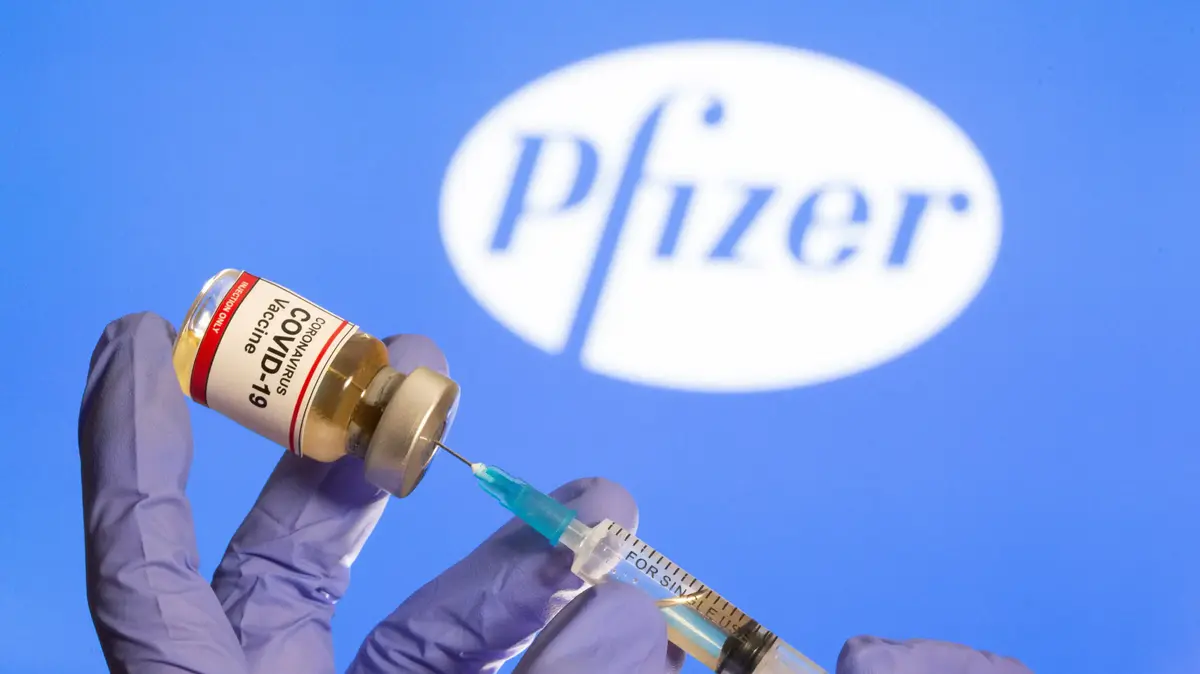Icon: enlarge
AstraZeneca vaccination doses
Photo: Nicolas Armer / dpa
In the USA they are vaccinating at a pace that Germany can only dream of.
The whole country is being immunized in converted stadiums, in parking lots, in drugstores and supermarkets.
To date, more than 75 million vaccine doses have been administered in the USA, in the entire EU there are only 30 million, in Germany a total of just over ten million.
Part of the reason why the US is vaccinating so quickly may be because it does not allow unnecessary bureaucracy to slow it down, that it does not complicate the process.
But it's mainly because Americans have enough vaccine in the country that they don't want to give back.
US President Joe Biden has retained his predecessor's de facto vaccine export ban.
When it comes to vaccination, the following also applies to Donald Trump's successor: America first.
And Europe?
Here one continues to rely on alliances in principle.
Meanwhile, AstraZeneca has continued to reduce the quantities of vaccine supplied to the EU.
Actually, it should be 90 million cans by the end of March.
This resulted in 40 million cans, and in the end only 30 million.
EU Commission chief Ursula von der Leyen recently complained that AstraZeneca had previously delivered less than ten percent of the agreed amount of vaccine.
Even before vaccinations with AstraZeneca were initially suspended in many EU countries, including Germany, the pressure on Europeans had grown to make more aggressive use of the export control mechanism that the Commission introduced in January - for the official justification, only an overview about the amount of vaccine exported from the EU.
That is all the more true in the new situation.
After all, AstraZeneca isn't the only vaccine made in the EU.
The control mechanism works like this: The manufacturers have to register exports with the competent authorities of the EU states from which the vaccines are to be exported.
If they prohibit export, the Commission can reverse the decision.
In the only known case so far - when Italy banned the export of 250,000 doses of the AstraZeneca vaccine to Australia - it did not.
This promptly led to international complications.
The Australian government accused the EU of "vaccination nationalism".
Shortly afterwards, EU Council President Charles Michel defended the decision and accused the USA and Great Britain of having set up "downright export bans" for vaccines.
This in turn provoked an angry reaction from the British government, which spoke of a "false claim".
According to a list by the EU Commission, 34 million doses of vaccine have so far been exported from the EU around the world - more than half of what the EU has received so far.
The largest buyer of EU exports is with a good nine million cans: Great Britain of all places.
In return, the EU gets from Great Britain: nothing.
AstraZeneca justifies the cuts in its deliveries by stating that the contract must first deliver to Great Britain.
Some EU politicians are now asking themselves: If the US and Great Britain do it, why don't we too?
»The impression is created that other countries are preferred over the EU«
Manfred Weber
"It gives the impression that other countries are preferred over the EU," said Manfred Weber (CSU), head of the EPP group in the European Parliament, last weekend of the "Welt am Sonntag".
As long as AstraZeneca does not fulfill its promises, "the EU should impose a general ban on exports of vaccine doses produced by the company in the EU."
The CDU MEP Peter Liese, for example, declared the export bans of the USA and Great Britain to be the "core of the problem".
The ban on exports to Australia imposed by Italy can therefore only be "the first step."
"We have to get vaccinated faster with the existing doses, involve general practitioners and specialists, but not create any new hurdles."
Karin Maag, health policy spokeswoman for the CDU parliamentary group in the Bundestag
Nobody in the Bundestag wants to have in common with the call for vaccination nationalism in the sense of the USA.
In the end, by stopping exports, Germany could also risk that other countries no longer supply important components for its own production.
The health policy spokeswoman for the CDU, Karin Maag, does not want to counter the protectionism of the USA with a ban on exports either in Germany or in Europe.
“For an export-oriented nation like us, the result falls on its feet when it is less possible to vaccinate in partner countries as a result of such a measure.
Since the virus does not stop at borders, such a step is also very difficult to justify epidemiologically, "she told SPIEGEL:" If every country withholds 'its' vaccines produced domestically or in Europe, no country can ultimately get its vaccinations plan safely and vaccinations take longer everywhere. "
Maag thinks: "We have to get vaccinations faster with the existing doses, involve general practitioners and specialists, but not create any new hurdles."
The health policy spokesman for the left parliamentary group, Achim Kessler, sees a different way out of the debacle: "Instead of joining a vaccine nationalism," he calls for a patent release for the production of the vaccines.
"If contractual delivery commitments to the EU are not fulfilled, one has to think about stopping the export of vaccine doses produced in the EU."
Christine Aschenberg-Dugnus, health policy spokeswoman for the FDP parliamentary group
At most, the health policy spokeswoman for the FDP parliamentary group in the Bundestag, Christine Aschenberg-Dugnus, dares cautiously.
"This pandemic is a global task that must be solved together," she told SPIEGEL.
»However, it cannot be the case that vaccine doses produced in the EU are exported while EU member states are being put off.
Because the EU is a major development and production location for vaccines.
If contractual delivery commitments to the EU are not fulfilled, one must think about stopping the export of vaccine doses produced in the EU. "
After all, there is a shortage of vaccines in the EU.
"The fact that the vaccine is produced here and then passed on rightly meets with displeasure."
Söder wants to streamline the “vaccination bureaucracy”
In Bavaria, meanwhile, they already have a plan to make vaccinations in Germany faster: Bavaria's Prime Minister Markus Söder and Health Minister Klaus Holetschek want to significantly streamline the “vaccination bureaucracy”.
The rigid vaccination sequence prevents vaccination quickly and a lot, said Söder in the ARD.
It needs more freedom.
"Then I think we could take a step forward until, hopefully, more vaccine comes in April." If AstraZeneca should be allowed to continue vaccinating, the lifting of the prioritization must be discussed, said Health Minister Holetschek.
"And then the vaccine has to be available to anyone who wants to be vaccinated."
"We need vaccines, vaccines, vaccines ..."
Spokesman for the KBV
The National Association of Statutory Health Insurance Physicians (KBV) had already called for a softening of the vaccination prioritization as soon as the vaccine is to be injected in the doctor's office.
But that only applies if enough vaccine is available: "As long as we have too few vaccines, prioritization actually makes sense," says an association spokesman for SPIEGEL, "in other words: we need vaccines, vaccines, vaccines ..."
Icon: The mirror









/cloudfront-eu-central-1.images.arcpublishing.com/prisa/DLTDDS5OAJK733QSV3Q65TPJR4.jpg)